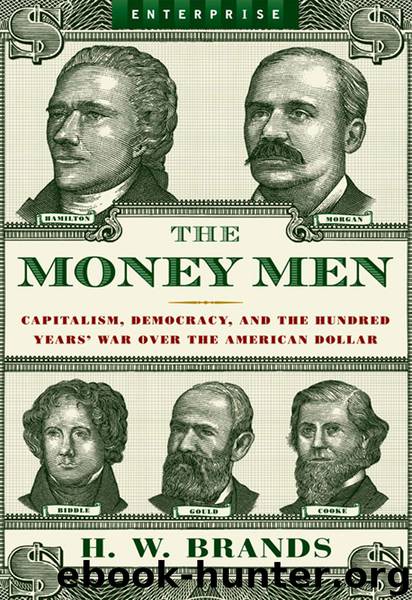The Money Men by H. W. Brands

Author:H. W. Brands
Language: eng
Format: epub
Publisher: W. W. Norton & Company
Published: 2006-05-04T16:00:00+00:00
IN FACT HE did intend to make money on the Union war bonds. Cooke cultivated Chase assiduously, hosting the Treasury secretary at his estate outside Philadelphia. Chase brought along his daughter, Katherine, who had served as the lady of the Chase household since her mother had died. Kate Chase was the darling of wartime Washington: beautiful, outgoing, the heart’s desire of all the young men who spied her on their way to the front. Jay Cooke was among the smitten. “Kate Chase spent Tuesday night with us,” he wrote his brother. “She is a glorious girl.” But Cooke kept his mind on business sufficiently to follow Chase when the secretary returned to Washington, leaving his daughter at Cooke’s. Partner William Moorhead telegraphed Cooke to say the Philadelphia office was missing him. “It is a loss in dollars and cents to have you absent.” But Moorhead reckoned Cooke knew what he was doing. “You are on a worthy mission, one that must not only result to the benefit of our worthy Uncle Sam, but some way or other to that of yourself and the house.”
How to benefit Uncle Sam was easy: sell the Union bonds. How to benefit Cooke & Company was harder. Cooke spent the first several months of the war making himself useful to Chase. He sold small issues of notes, purchased gold and foreign currencies on the Treasury’s behalf, and offered Chase advice on various matters. But the modest fees he earned weren’t what he had in mind. “We can do the work but must be careful not to work for honor alone,” he explained to Henry, who had opened the Washington office Jay recommended. “I can easily understand how we can purchase and deliver gold et cetera, but do not understand how we are to get paid for it.”
In time he contrived a plan—audacious, even unheard of, yet appealing to Chase, whose frustration with the traditional bankers mounted by the month. The war grew more expensive, but the bankers, preoccupied with their profit margins, became increasingly reluctant to purchase the Treasury issues. They insisted that Chase let them buy below par, which he refused to do, believing it would evince desperation. Chase considered marketing the American bonds in Europe, only to be told by the Rothschilds’ agent that any such attempt would be futile. Chase then turned to Cooke, who proposed to become the Treasury’s agent. The government hoped to sell $500 million in six percent bonds that could be called in five years and matured in twenty years. Cooke said he would sell these “five-twenties” for a commission of one-half of one percent on the first $10 million and three-eighths of a percent on additional sales. Expenses would come out of his commission.
The novel part of Cooke’s plan was his projected clientele. Bond issues heretofore had been purchased almost entirely by banks and in large quantities. Cooke proposed to market the bonds to the American people—to convert bond sales from a wholesale business to a retail one.
Download
This site does not store any files on its server. We only index and link to content provided by other sites. Please contact the content providers to delete copyright contents if any and email us, we'll remove relevant links or contents immediately.
International Integration of the Brazilian Economy by Elias C. Grivoyannis(111059)
The Radium Girls by Kate Moore(12028)
Turbulence by E. J. Noyes(8051)
Nudge - Improving Decisions about Health, Wealth, and Happiness by Thaler Sunstein(7707)
The Black Swan by Nassim Nicholas Taleb(7129)
Rich Dad Poor Dad by Robert T. Kiyosaki(6633)
Pioneering Portfolio Management by David F. Swensen(6301)
Man-made Catastrophes and Risk Information Concealment by Dmitry Chernov & Didier Sornette(6019)
Zero to One by Peter Thiel(5802)
Secrecy World by Jake Bernstein(4753)
Millionaire: The Philanderer, Gambler, and Duelist Who Invented Modern Finance by Janet Gleeson(4478)
The Age of Surveillance Capitalism by Shoshana Zuboff(4293)
Skin in the Game by Nassim Nicholas Taleb(4250)
The Money Culture by Michael Lewis(4207)
Bullshit Jobs by David Graeber(4191)
Skin in the Game: Hidden Asymmetries in Daily Life by Nassim Nicholas Taleb(4007)
The Dhandho Investor by Mohnish Pabrai(3765)
The Wisdom of Finance by Mihir Desai(3748)
Blockchain Basics by Daniel Drescher(3583)
